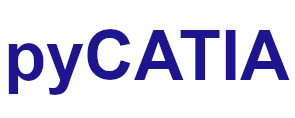pycatia.knowledge_interfaces.optimization_constraints¶
Module initially auto generated using V5Automation files from CATIA V5 R28 on 2020-06-11 12:40:47.360445
Warning
The notes denoted “CAA V5 Visual Basic Help” are to be used as reference only. They are there as a guide as to how the visual basic / catscript functions work and thus help debugging in pycatia.
- class pycatia.knowledge_interfaces.optimization_constraints.OptimizationConstraints(com_object)¶
Note
CAA V5 Visual Basic Help (2020-06-11 12:40:47.360445)
System.IUnknownSystem.IDispatchSystem.CATBaseUnknownSystem.CATBaseDispatchSystem.CollectionOptimizationConstraintsRepresents a collection of Optimization Constraint.- add_constraint(constraint_expression: str) OptimizationConstraint¶
Note
- CAA V5 Visual Basic Help (2020-06-11 12:40:47.360445))
- o Func AddConstraint(CATBSTR constraintExpression) AsOptimizationConstraintAdds a optimization constraint. This parameter must not be read only.
- Parameters:
constraint_expression (str) –
- Return type:
- item(i_index: cat_variant) OptimizationConstraint¶
Note
- CAA V5 Visual Basic Help (2020-06-11 12:40:47.360445))
- o Func Item(CATVariant iIndex) As OptimizationConstraintReturns an optimization constraint using its index or its name from theoptimization constraints collection.Parameters:iIndexThe index or the name of the optimization constraint to retrievefrom the collection of optimization constraints. As a numerics, this index isthe rank of the optimization constraint in the collection. The index of thefirst optimization constraint in the collection is 1, and the index of the lastoptimization constraint is Count. As a string, it is the name you assigned tothe optimization constraint using theAnyObject.Name property or when changing the optimization constraintname by the property panel.Returns:The retrieved optimization constraintExample:This example retrieves the last optimization constraint in theoptimization constraints collection.Set lastConstraint = constraints.Item(constraints.Count)
- Parameters:
i_index (cat_variant) –
- Return type:
- remove_constraint(i_index: cat_variant) None¶
Note
- CAA V5 Visual Basic Help (2020-06-11 12:40:47.360445))
- o Sub RemoveConstraint(CATVariant iIndex)Removes a given optimization constraint using its index or its name fromthe optimization constraints collection.Parameters:iIndexthe name of the constraint if argument is a string or the index ofthe constraint if argument is an integer.
- Parameters:
i_index (cat_variant) –
- Return type:
None
